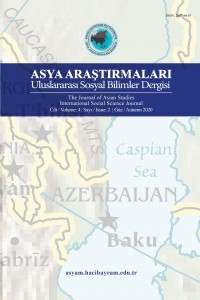Öz
Throughout the last four centuries, some countries with advanced military power and expansionist ambitions have been increasing their influence over other states and regions in order to exploit the resources available in these geographies to strengthen their own nation or empire. The division between imperialist states and exploited ones has become more visible and the gap has been becoming wider. Africa has been suffering from the attacks and invasions of numerous European states. Countries such as Portugal, Spain, France, Great Britain and the Netherlands have been attracted by rich natural reserves in the continent and they were advantageous in terms of relative military strength. China, however, adopted a different strategy, partially linked to its national identity and cultural dimensions. This article will introduce different lenses to the readers by combining the Western and Chinese points of view, and will try to picture the extent of China’s imperialist ambitions within the continent.
Anahtar Kelimeler
Kaynakça
- Ucheara, E. Kieran. (2009). China-Africa Relations in the 21st Century: Engagement, Compromise and Controversy. Uluslararası İlişkiler, Volume 6, No 23, 95-111.
- Sun, Yun. (2004). Africa in China’s Foreign Policy.
- Hanauer, Larry; Morris, Lyle J. (2014). China in Africa: Implications of a Deepening Relationship.
- Globalsecurity.org. (2018). China’s Foreign Relations – Africa.
- Lafargue, François. (2005). China’s Presence in Africa. China Perspectives [Online], 61.
- Vucetic, Srdjan. (2017). Identity and Foreign Policy. Oxford Research Encyclopedia of Politics, DOI:10.
- Hofstede Insights. Compare Countries. Retrieved from https://www.hofstede-insights.com/product/compare-countries/.
- Webb, Ken. (2014). Age of Imperialism. Nelson Modern History.
- Omvedt, Gail. (1969). Imperialism and Rural Modernization. Berkeley Journal of Sociology vol 14, 130-151.
- Kwatiah, Natasha. Colonial Exploitation in India: Forms and Consequences. Retrieved from: https://www.economicsdiscussion.net/india/colonial-exploitation/colonial-exploitation-in-india-forms-and-consequences/19005.
- Heiss, Mary Ann. (2002). The Evolution of the Imperial Idea and U.S. National Identity. Diplomatic History, Vol 26 No 4.
- Al Jazeera. (2012). Western oil firms remain as US exits Iraq. Retrieved from: https://www.aljazeera.com/indepth/features/2011/12/2011122813134071641.html
- Porter, Bernard. British and American ‘Imperialisms’ Compared. Retrieved from: https://historynewsnetwork.org/article/27021.
- Dunn, Thomas M. (2013). The Failings of Liberal Modernization Theory. Retrieved from: https://www.e-ir.info/2013/06/26/the-failings-of-liberal-modernisation-theory/.
- Berger, Mark T. (2002). Decolonisation, Modernisation and Nation-Building:Political Development Theory and the Appeal of Communism in Southeast Asia, 1945–1975. Journal of Southeast Asian Studies, 34 (3).
- Katzenstein, Peter J. (1996). The Culture of National Security: Norms and Identity in World Politics.
- Council on Foreign Relations. (2017). China in Africa. Retrieved from: https://www.cfr.org/backgrounder/china-africa.
- Lai, Hongyi; Lu, Yiyi. (2012). China’s Soft Power and International Relations. Routledge, London
- Kim, Yejoo. (2013). Chinese Investment and African Peace and Security: The Case of Ethiopia. [in] China-Africa Relations: Governance, Peace and Security, 181-194.
- Kuo, Steven C. Y. (2020). China’s approach to peace in Africa is different. How and why. Retrieved from https://theconversation.com/chinas-approach-to-peace-in-africa-is-different-how-and-why-129467.
Ayrıntılar
| Birincil Dil | İngilizce |
|---|---|
| Bölüm | Makaleler |
| Yazarlar | |
| Yayımlanma Tarihi | 30 Aralık 2020 |
| Yayımlandığı Sayı | Yıl 2020 Cilt: 4 Sayı: 2 |


